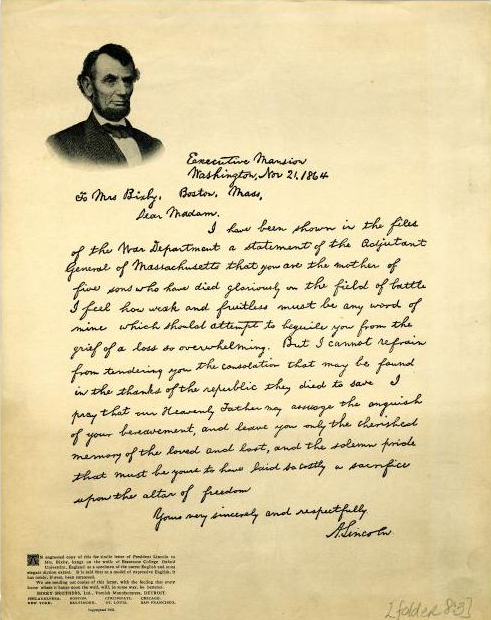Notable Birthdays: Distinguished Illinois figures born in November
- Details
 November is drawing to a close. Before turning our heads toward jingle bells, let’s take a moment to look back at this month while our minds are still on turkey and pumpkin pie. Many birthdays of note from those born in Illinois occurred in November. History starts the moment we are born. The famous, historic, or otherwise distinguished figures who can track their birthplaces back to Illinois in November are as follows:
November is drawing to a close. Before turning our heads toward jingle bells, let’s take a moment to look back at this month while our minds are still on turkey and pumpkin pie. Many birthdays of note from those born in Illinois occurred in November. History starts the moment we are born. The famous, historic, or otherwise distinguished figures who can track their birthplaces back to Illinois in November are as follows:
- Maria Shriver: Former First Lady of California, wife of Arnold Schwarzenegger and American journalist and author, born on Nov. 6, 1955 in Chicago
- Kiernan Shipka: Actress best known for her role as Sabrina on the Chilling Adventures of Sabrina, born on Nov. 10, 1999 in Chicago
- Jimmy Garoppolo: American football quarterback for the San Francisco 49ers, born on Nov. 2, 1991 in Arlington Heights
- Aaron Swatrz: Computer programmer and internet-protégé and activist, in 1999 at age 12 he created the encyclopedia website The Info Network, born on Nov. 8, 1986 in Chicago
- Terrence Malick: Screenwriter and film director, nominated for the Academy Award Best Director for the movie The Thin Red Line, born on Nov. 30, 1943 in Ottawa
- Nelson Ellis: Actor and playwright best known for his role as Lafayette Reynolds in the television show True Blood, born on Nov. 30, 1977 in Harvey
Did you know? Chicago had its own Spiderman
- Details
 Chicago has had its very own Spiderman! While he did not swing from web to web like the comic book crusader, Spider Dan still did whatever a spider can during his two big climbs in the windy city. On Memorial Day of 1981, Dan Goodwin, also known as Spider Dan, climbed all 110 stories of the Sears Tower. The daredevil completed the death defying stunt not only in opposition to great winds, but also against firefighter interference.
Chicago has had its very own Spiderman! While he did not swing from web to web like the comic book crusader, Spider Dan still did whatever a spider can during his two big climbs in the windy city. On Memorial Day of 1981, Dan Goodwin, also known as Spider Dan, climbed all 110 stories of the Sears Tower. The daredevil completed the death defying stunt not only in opposition to great winds, but also against firefighter interference.
Spider Dan did not complete the climb for his own personal glory and recognition. Rather, the rock climber completed the stunt to showcase the difficulty to escape a skyscraper from the highest floors in case of emergencies. He was inspired after witnessing a fire in the MGM Grand Hotel where 85 people had been killed by the blaze due to smoke inhalation on the highest floors where guests could not escape. Dan wanted to prove that despite the efforts firefighters put forward, the tallest levels of some buildings could not be reached by design in case of emergencies. Spider Dan’s point came across as, while firefighters tried to stop his ascent to the top, he still completed the 110 story climb on his own. The climb also proved the difficulty of escaping high floors as he completed it with a lot of effort and risk, even using climbing equipment.
Spider Dan was not done there, however. In the same year he also scaled the 100 stories of the John Hancock Building. Again the fire department desperately tried to stop his ascent. Spider Dan, similar to Spiderman in the comic books, faced backlash from the city’s officials. Finally, impressed by his prowess and in a moment of grace, Mayor Byrne of Chicago at the time called off the fire department. Spider Dan completed two harrowing climbs on Chicago skyscrapers in the same year, showing city dwellers anything is possible if you put your mind to it.
Did you know? Legend says on Nov. 21, 1864 Lincoln wrote to a Civil War widow
- Details

At that time, it was common for copies of presidential messages to be published and sold as souvenirs, so it would make sense Lincoln’s letter was in the Boston Evening Transcript. However, some historians seem to think the letter was actually written by Lincoln’s secretary, John Hay. The mystery of the legitimacy of the letter grew when scholars discovered Mrs. Bixby actually only seemed to lose three sons during the Civil War, the other one was honorably discharged and the second was dishonorably thrown out of the Army. While the loss of three sons is still unimaginable, the letter claiming the loss of all five has thrown it into the unknown facts of history. Perhaps a report came in wrong and Lincoln truly believed she had lost five of her children or maybe during the grief surrounding the country at the time Lincoln wanted to offer up condolences to the nation and thought Mrs. Bixby’s story was the best to address, having his secretary help.
Whatever the truth behind the letter is, it has only grown in infamy in the modern day as it was quoted in the famous movie Saving Private Ryan by the character Gen. George C. Marshall who was played by Harve Presnell. The movie tells the story of Captain Miller, played by Tom Hanks, and his men as the go behind enemy lines to find Private Ryan. Ryan’s three brothers have been killed in combat. The soldiers set out hoping to save Ryan’s mother from the same fate as Mrs. Bixby. While the Lincoln letter’s origins are unclear, the words contained within it still inspire compassion for U.S. soldiers and their families to this day.
“It’s Bond, James Bond,” depicted in world’s largest corn maze in Illinois
- Details

The maze was shaken, not stirred, as it was created to also feature a Bond girl, a Monaco casino and an Aston Martin car driven by 007. The corn maze is distinguished as the world’s largest corn maze, it stretches 10 miles and spans over a 28-acre area. Those who came to visit the maze needed all the skills of a great spy to work their way through it, as the maze is actually created out of 4 smaller mazes, each one having its own dedicated in and out path. The maze was created using state of the art design and planting technology. Last year the Richardson Farm depicted the famous band “The Beatles” in their corn. Every year Illinoisans wait in anticipation to see what the farmers will create next, and hopes are high for another spectacular maze in 2023.
The corn maze was open September through October of this year, and the amazing design of James Bond through the decades drew a lot of media attention to the Illinois farm. As fall season comes to a close and the holiday season is upon us, the Richardson Farm is switching gears from corn to pine. The Richardson Christmas Tree Farm will be opening the day after thanksgiving, and those who enjoyed the spy-level maze can now enjoy getting a tree with their families for the holidays.
Those who wish to visit the farm can visit their website here.



